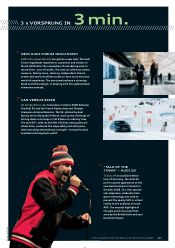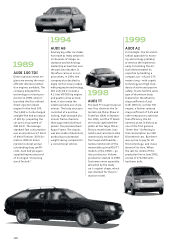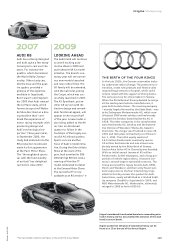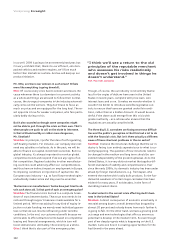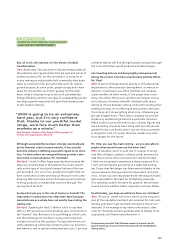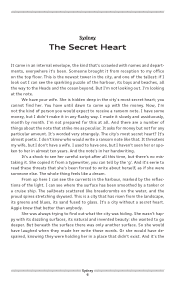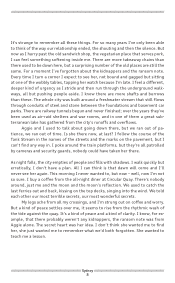Audi 2008 Annual Report Download - page 125
Download and view the complete annual report
Please find page 125 of the 2008 Audi annual report below. You can navigate through the pages in the report by either clicking on the pages listed below, or by using the keyword search tool below to find specific information within the annual report.122
in as well. 2009 is going to be an extremely hard year, but
I’m very confident that, thanks to our efficient, emotion-
packed vehicles and modern engines, we’ll fare much
better than markets as a whole. And we will keep up our
product initiative.
Mr. Otte, are there ever winners in such crises? It feels
more like everything is going downhill.
Otte: Of course every crisis has its winners and losers. Be-
cause whenever there is a downturn in economic activity
as a whole and things are allowed to follow their normal
course, the strongest companies in the industry automati-
cally come out the winners. They don’t have to focus as
much on prices and are equipped for the long haul. The ex-
act opposite is true for weaker companies, who fare partic-
ularly badly during a crisis.
But it also sounded as though some companies might
not be able to pull through the crisis on their own. That’s
when people are quick to call on the state to intervene.
Is that attitude healthy or rather more dangerous,
Mr. Strotbek?
Strotbek: In principle, I prefer the idea of self-regulating,
self-healing markets. For instance, our company does not
need any subsidies or bailouts. As in the past, we will be
able to finance our capital investment ourselves. But in a
global industry, it’s always important to monitor global
competitive trends and respond if we see any signs of un-
fair competition. Regional subsidies in other manufactur-
ing countries could adversely affect our competitiveness,
and thus have an indirect impact on employment in Europe.
So imposing conditions on injections of capital into the
European auto industry – e.g. to fund future technologies –
undoubtedly makes sense and may even be essential.
The German car manufacturers’ banks have just tried to ob-
tain such state aid. Is that part of such an emergency plan?
Strotbek: The financial crisis has led to a complete break-
down of trust between banks. That trust now needs to be
restored through support measures made available for a
limited period. We’re not asking for any kind of equity in-
jection or state funding; we merely want individual guaran-
tees so that we can resume refinancing under sensible
conditions. In the end, our customers benefit because we
will be able to offer attractive terms based on competitive
leasing and financial arrangements, which in turn will
boost demand and, ultimately, the economy as a whole.
Otte: I think that is also part of the emergency plan.
Though, of course, the car industry is not entirely blame-
less for the orgies of debt we have seen in the United
States in recent years, complete with price wars, zero
interest loans and so on. It makes me wonder whether it
wouldn’t be better to introduce sensible legislative con-
trols to ensure that loans are granted under fair condi-
tions, rather than as a hidden discount. It would be won-
derful if the state could emerge from this crisis with
greater authority – as a referee who ensures that the
regulations are actually complied with.
The three big U.S. carmakers are facing enormous difficul-
ties and the public’s perception is that this had a lot to do
with the financial crisis. But isn’t there actually a different
cause of these structural problems in the car sector?
Strotbek: I believe the structural challenge that the car in-
dustry is facing is an entirely separate issue to what is cur-
rently happening. The question of how structures need to
be changed in the medium and long term should be con-
sidered independently of the present upheaval. As to the
United States, it is a very distinct market that applies dif-
ferent standards of viability and competitiveness. Ever
since the early 1990s, its domestic industry has been under
attack by foreign manufacturers, e.g. from Japan, who
entered the market with locally built products. So the fun-
damental weakness of certain major carmakers has been
evident for many years, if not decades, in the form of
dwindling market shares.
To what extent is the current crisis affecting Audi’s busi-
ness in the United States?
Strotbek: A direct consequence of economic uncertainty is
restraint among buyers; overall demand has dropped by
almost 20 percent and nobody knows how much further it
is going to fall. On the other hand, we have a growing prod-
uct range and new technologies that offer us enormous
potential to develop in the medium term. So even though
part of me deeply regrets what is happening on the U.S.
market, I also see how it is creating opportunities for the
Audi brand in the years ahead.
“I think we’ll see a return to the old
principles of the reputable merchant
who assesses his risks realistically
and doesn’t get involved in things he
doesn’t understand.”
Prof. Max Otte, economist
Vorsprung Foresight



